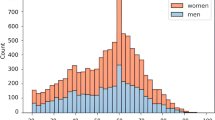Abstract
We have studied computer-aided diagnosis of otoneurological diseases which are difficult, even for experienced specialists, to determine and separate from each other. Since neural networks require plenty of training data, we restricted our research to the commonest otoneurological diseases in our database and to the very most essential parameters used in their diagnostics. According to our results, neural networks can be efficient in the recognition of these diseases provided that we shall be able to add our available cases concerning those diseases which are rare in our database. We compared the results yielded by neural networks to those given by discriminant analysis, genetic algorithms and decision trees.
Preview
Unable to display preview. Download preview PDF.
Similar content being viewed by others
References
Auramo, Y., Juhola, M., Pyykkö, I.: An expert system for the computer-aided diagnosis of dizziness and vertigo. Med. Inform. 18 (1993) 293–305.
Auramo, Y., Juhola, M.: Comparison of inference results of two otoneurological expert systems. Int. J. Bio-Med. Comput. 39 (1995) 327–335.
Juhola, M., Auramo, Y., Kentala, E., Pyykkö, I.: An essay on power of expert systems versus human expertise. Med. Inform. 20 (1995) 133–138.
Auramo, Y., Juhola, M.: Modifying an expert system construction to pattern recognition solution. Artif. Intell. Med. 8 (1996) 15–21.
Kentala, E., Pyykkö, I., Auramo, Y., Juhola, M.: Database for vertigo. Otolaryngol. Head Neck Surg. 112 (1995) 383–390.
Kentala, E., Pyykkö, I., Auramo, Y., Juhola, M.: Computer assisted data collection in vestibular disorders. Acta Otolaryngol. Suppl. 520 (1995) 205–206.
Kentala, E., Pyykkö, I., Auramo, Y., Juhola, M.: Reasoning in expert system ONE for vertigo work-up. Acta Otolaryngol. Suppl. 520 (1995) 207–208.
Kentala, E., Pyykkö, I., Auramo, Y., Juhola, M.: Otoneurological expert system. Ann. Otol. Rhinol. Laryngol. 105 (1996) 654–658.
Kentala, E. A neurotological expert system for vertigo and characteristics of six otologic diseases involving vertigo. MD thesis. University of Helsinki, Finland. 1996.
Kentala, E.: Characteristics of six otologic diseases involving vertigo. Am. J. Otol. 17 (1996) 883–892.
Kentala, E., Auramo, Y., Juhola, M., Pyykkö, I.: Comparison between diagnoses of human experts and a neurotological expert system. Ann. Otol. Rhinol. Laryngol. 107 (1998) 135–140.
Laurikkala, J., Juhola, M.: A genetic-based machine learning system to discover the diagnostic rules for female urinary incontinence. Comp. Meth. Progr. Biomed. 55 (1998) 217–228.
Kentala, E., Laurikkala, J., Pyykkö, I., Juhola, M.: Discovering diagnostic rules from a neurotologic database with genetic algorithms. Accepted to Ann. Otol. Rhinol. Laryngol.
Viikki, K., Kentala, E., Juhola, M., Pyykkö, I.: Decision tree induction in the diagnosis of otoneurologic diseases. Submitted to Med. Inform.
Kentala, E., Viikki, K. Pyykkö, I. Juhola, M.: Production of diagnostic rules from a neurotologic database with decision trees. Accepted to Ann. Otol. Rhinol. Laryngol.
Schafer, J.L.: Analysis of incomplete multivariate data. John Wiley & Sons, New York (1997).
Neural network toolbox for use with MATLAB. MathWorks, Inc., Massachusetts (1992).
Fu, L.M.: Neural networks in computer intelligence. McGraw-Hill, Singapore (1994).
Swingler, K.: Applying neural networks. Academic Press, London (1996).
Pesonen, E., Eskelinen, M., Juhola, M.: Comparison of different neural network algorithm in the diagnosis of acute appendicitis. Int. J. Bio-Med. Comput. 40 (1996) 227–233.
Author information
Authors and Affiliations
Editor information
Editors and Affiliations
Rights and permissions
Copyright information
© 1999 Springer-Verlag Berlin Heidelberg
About this paper
Cite this paper
Juhola, M., Laurikkala, J., Viikki, K., Auramo1, Y., Kentala, E., Pyykkö, I. (1999). Neural Network Recognition of Otoneurological Vertigo Diseases with Comparison of Some Other Classification Methods. In: Horn, W., Shahar, Y., Lindberg, G., Andreassen, S., Wyatt, J. (eds) Artificial Intelligence in Medicine. AIMDM 1999. Lecture Notes in Computer Science(), vol 1620. Springer, Berlin, Heidelberg. https://doi.org/10.1007/3-540-48720-4_23
Download citation
DOI: https://doi.org/10.1007/3-540-48720-4_23
Published:
Publisher Name: Springer, Berlin, Heidelberg
Print ISBN: 978-3-540-66162-7
Online ISBN: 978-3-540-48720-3
eBook Packages: Springer Book Archive




